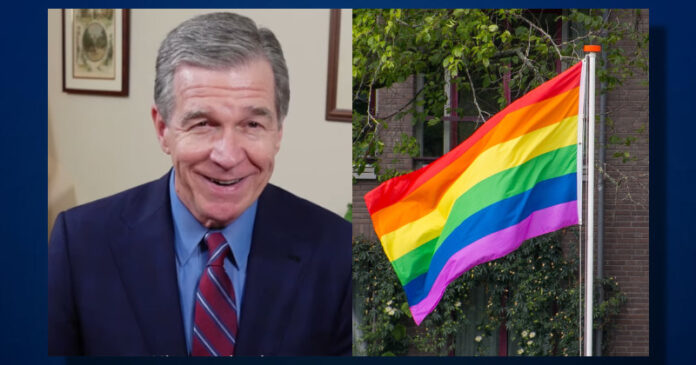
North Carolina Governor Roy Cooper (D) vetoed three bills from state legislators. After vetoing the legislation, Cooper, who is approaching his final year in as Governor, proceeded to accuse North Carolina Republicans of “inflaming their political culture wars, in defense of his decision.
“For campaign purposes only, Republicans are serving up a triple threat of political culture wars using government to invade the rights and responsibilities of parents and doctors, hurting vulnerable children and damaging our state’s reputation and economy like they did with the harmful bathroom bill,” Cooper said in an official statement. “Instead of scheming for the next election, Republicans should get to work investing in our public schools and teachers, lowering the cost of living and creating more stability for middle class families.”
On North Carolina House Bill 574, the “Fairness in Women’s Sports Act”, would have banned minors who are biological males from joining women’s sports teams. Other states have considered or passed similar legislation after biological male Leah Thomas switched to his university’s female swim team and defeated biological females in the final rounds.
“We don’t need politicians inflaming their political culture wars by making broad, uninformed decisions about an extremely small number of vulnerable children that are already handled by a robust system that relies on parents, schools and sports organizations,” Cooper said. “Republican governors in other states have vetoed similar bills because they hurt their states’ reputation and economy and because they are neither fair nor needed.”
Regarding North Carolina House Bill 808, which would ban gender transition surgery for minors, Gov. Cooper condemned the bill as a danger for vulnerable youth and their mental health.
“A doctor’s office is no place for politicians, and North Carolina should continue to let parents and medical professionals make decisions about the best way to offer gender care for their children,” Cooper said. “Ordering doctors to stop following approved medical protocols sets a troubling precedent and is dangerous for vulnerable youth and their mental health. The government should not make itself both the parent and the doctor.”
Cooper’s assertion that blocking gender transition surgery is dangerous for vulnerable youth lacks consensus. National pediatric and psychological organizations in the United Kingdom, France, Australia, New Zealand, Finland, and Sweden are reconsidering the use of hormones and surgeries and calling for rigorous systematic review of available evidence regarding the safety, efficacy, and risks of childhood social transition, puberty blockers, cross sex hormones and surgery. Sweden and Finland ended their use of puberty blockers and reversed their endorsement of gender transition treatments for children, including hormone replacement therapy. They cited concerns about the inherent risks and dangers posed to the patients, including reproductive risks and other critical issues such as bone density.
Earlier this year, Vanderbilt University Medical Center paused its practice of gender affirming therapies based on “new recommendations” from the World Professional Association for Transgender Health.
On Senate Bill 49, titled the “Parent’s Bill of Rights”, Cooper quoted a misnomer to describe an education bill which was modeled after a bill in Florida that was mischaracterized by Democratic opponents and former Disney CEO Bob Chapek as the ‘Don’t say gay bill.” Major news outlets and Democrats across the country continue to use the phrase, which was coined by Florida’s self-touted most liberal state representative, Anna Eskamani. Neither North Carolina’s bill nor Florida’s bill mention or ban use of the word gay or homosexuality by students or teachers. The bills instruct kindergarten through third-grade teachers to refrain from any formal teaching lessons on sexual orientation and gender identity. Despite those facts, Cooper recycled the “Don’t say Gay Bill” quote when made the following statement on his veto of SB 49:
“Parents are the most essential educators for their children and their involvement must be encouraged, but this bill will scare teachers into silence by injecting fear and uncertainty into classrooms, Cooper said. “This “Don’t Say Gay” bill also hampers the important and sometimes lifesaving role of educators as trusted advisers when students have nowhere else to turn. The rights of parents are well established in state law, so instead of burdening schools with their political culture wars, legislators should help them with better teacher pay and more investments in students.”




